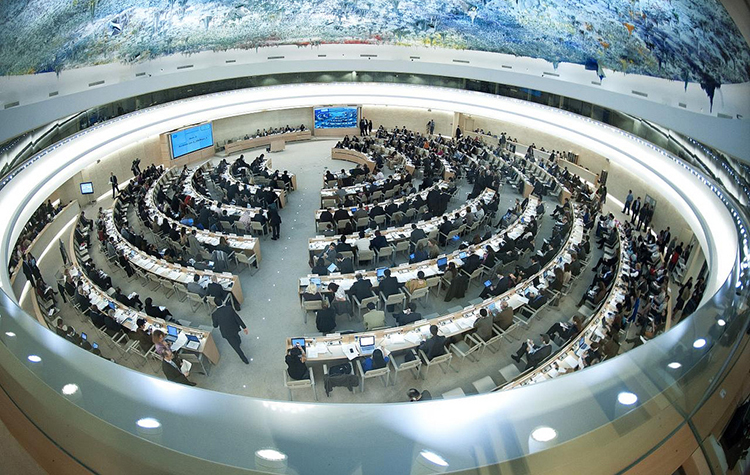FORUM-ASIA organised five side events during the 36th regular session of the UN Human Rights Council. Topics included human rights in Cambodia and the Philippines, as well as broader themes such as the foreign policy of Southern States, the documentation of international human rights standards and practices, and indigenous and environmental human rights defenders.
Cambodia: A Human Rights Crisis
FORUM-ASIA co-organised a side event on human rights in Cambodia together with Article 19, CIVICUS, Human Rights Watch, ICJ, ISHR, and OMCT on 19 September 2017.
Rosanna Ocampo, UN Advocacy Programme Officer of FORUM-ASIA, stressed the importance of having a strong resolution on Cambodia during this session of the Human Rights Council, and that would enable the Council to closely monitor and scrutinise the situation in Cambodia ahead of its July 2018 general elections. This is crucial given recent examples of shrinking democratic space in the country, including legal harassment of the political opposition, threats against human rights defenders, and crackdowns on NGOs and media.
Kingsley Abbott, Senior International Legal Adviser for Southeast Asia, of the International Commission of Jurists analysed the situation of the rule of law in Cambodia. He described the “weaponization” of legislation to silence dissent with the assistance of a judiciary which lacks independence and impartiality. He pointed out that this is achieved under the guise of the legitimate application of old laws such as those of criminal defamation and treason and the passage of new laws such as the Law on Associations and Non-Governmental Organizations (LANGO) and amendments to the Political Parties Law. He also set out how Cambodia often invokes the principle of the “rule of law” to justify its actions, which has nothing to do with the “rule of law” as properly understood.
In conclusion, Laila Matar, Senior UN Advocate of Human Rights Watch, who moderated the discussion, noted that the resolution on Cambodia during the current Council session was the last regularly scheduled resolution before elections in 2018. Therefore, it is important for the Council to take action.
Supporting Indigenous and Environmental Civil Society
FORUM-ASIA co-organised a side event on supporting indigenous and environmental civil society on 21 September 2017 together with CIVICUS: World Alliance for Citizen Participation, Global Witness, International Service for Human Rights (ISHR), and The Observatory for the Protection of Human Rights Defenders.
The side event commenced with Victoria Tauli-Corpuz, Special Rapporteur on the rights of indigenous peoples, who provided instances of human rights violations against those opposing any political regime and the rise of impunity, including examples from Philippines. She pointed out that these violations are justified as national security, with governments claiming that human rights defenders are committing acts of terrorism. Also, environmental human rights defenders who protest against mining operations are faced with charges of economic sabotage.
Following this, Michel Forst, Special Rapporteur on human rights defenders listed recommendations to protect human rights defenders, including zero tolerance on killings of human rights defenders; adoption of legislation that create due diligence obligations for states and companies; developing laws and legal frameworks in consultation with local affected communities; and impartial investigation of cases against human rights defenders by states.
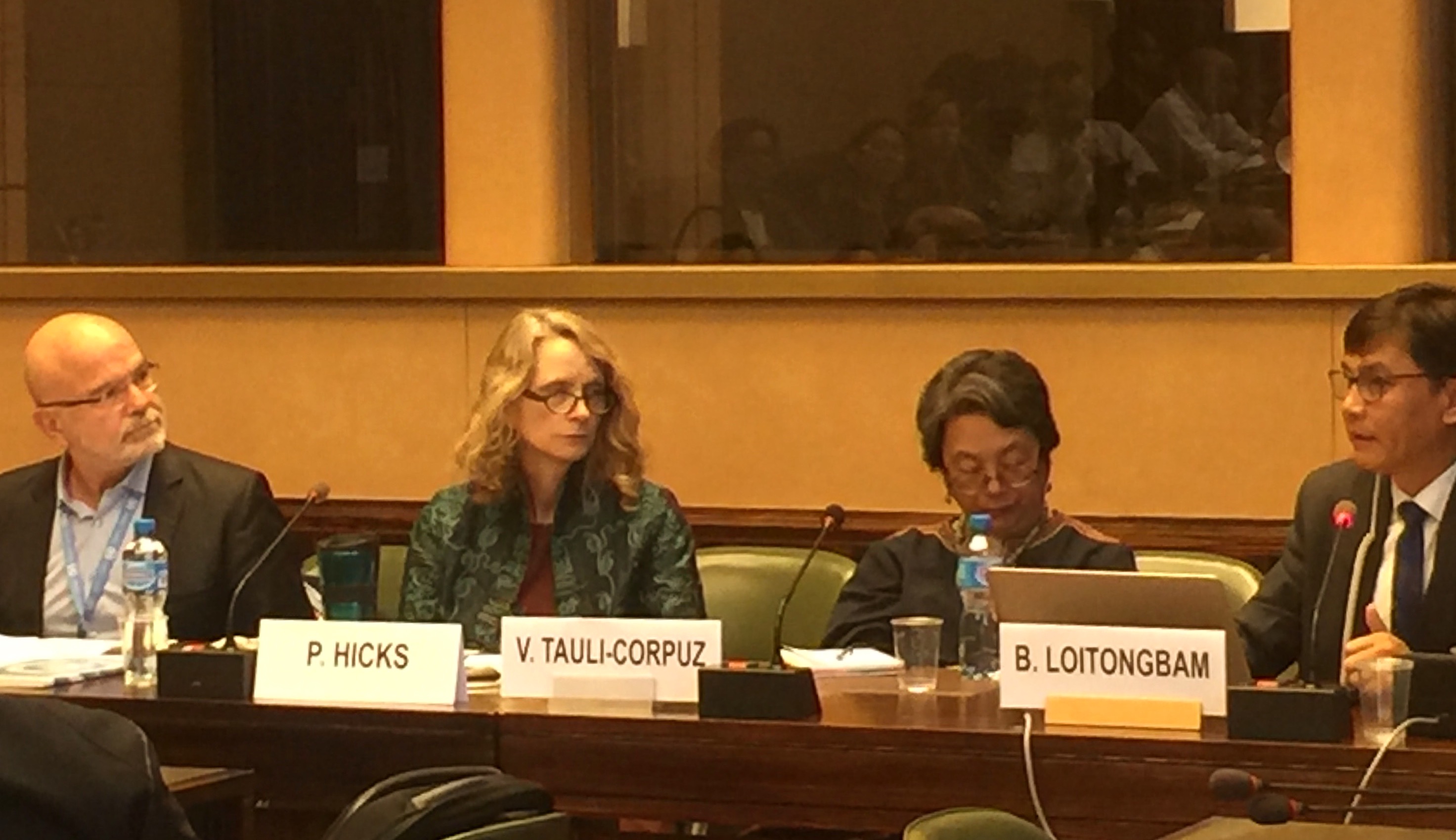
Medardo Mairena Sequeira, Coordinator of the National Council for the Defence of the Land, Lake and Sovereignty, explained the struggle of environmental rights defenders in Nicaragua when faced with situations like the construction of the Inter-Oceanic Canal Project. He emphasised that governments are often involved directly or by their funding of these projects. Foreign governments also support or turn a blind eye to the violation of rights by the host government.
On the effects of the extractive industry on human rights in Africa, Clément Voule, African advocacy director and programme manager of the International Service for Human Rights (ISHR), provided examples of this in Liberia, the Ogoni case in Nigeria, and the Democratic Republic of Congo. He stated that the violation of human rights and land rights continued due to the absence of rule of law. Through corruption, this also affects governance.
Babloo Loitongbam, Executive Director of Human Rights Alert India, a FORUM-ASIA member organisation, highlighted the effects of development on the environment in the north-eastern states of India. The government uses force and harsh legislation to stop all opposition against the government’s actions. These are used against the local population, indigenous leaders and environmental rights defenders. He stated that this has resulted in a type of internal colonialism that has gone unnoticed.
Foreign Policy of Southern States
Together with Conectas, CIVICUS and the Commonwealth Human Rights Initiative (CHRI), FORUM-ASIA organised a side event on 21 September 2017 on the foreign policy of Southern States. The event was moderated by R. Iniyan Ilango of FORUM-ASIA.
Susan Wilding of CIVICUS outlined the interaction between civil society and the government of South Africa on aspects related to foreign policy. Looking at the example of consultation sessions by the government with civil society on the Human Rights Council, she detailed the shortcomings in the process, including the fact that it is merely a checkbox exercise. The process also lacks transparency, and has problems with the distance and location. This proves to be an obstacle for South Africa in its goal of being a frontrunner on human rights.
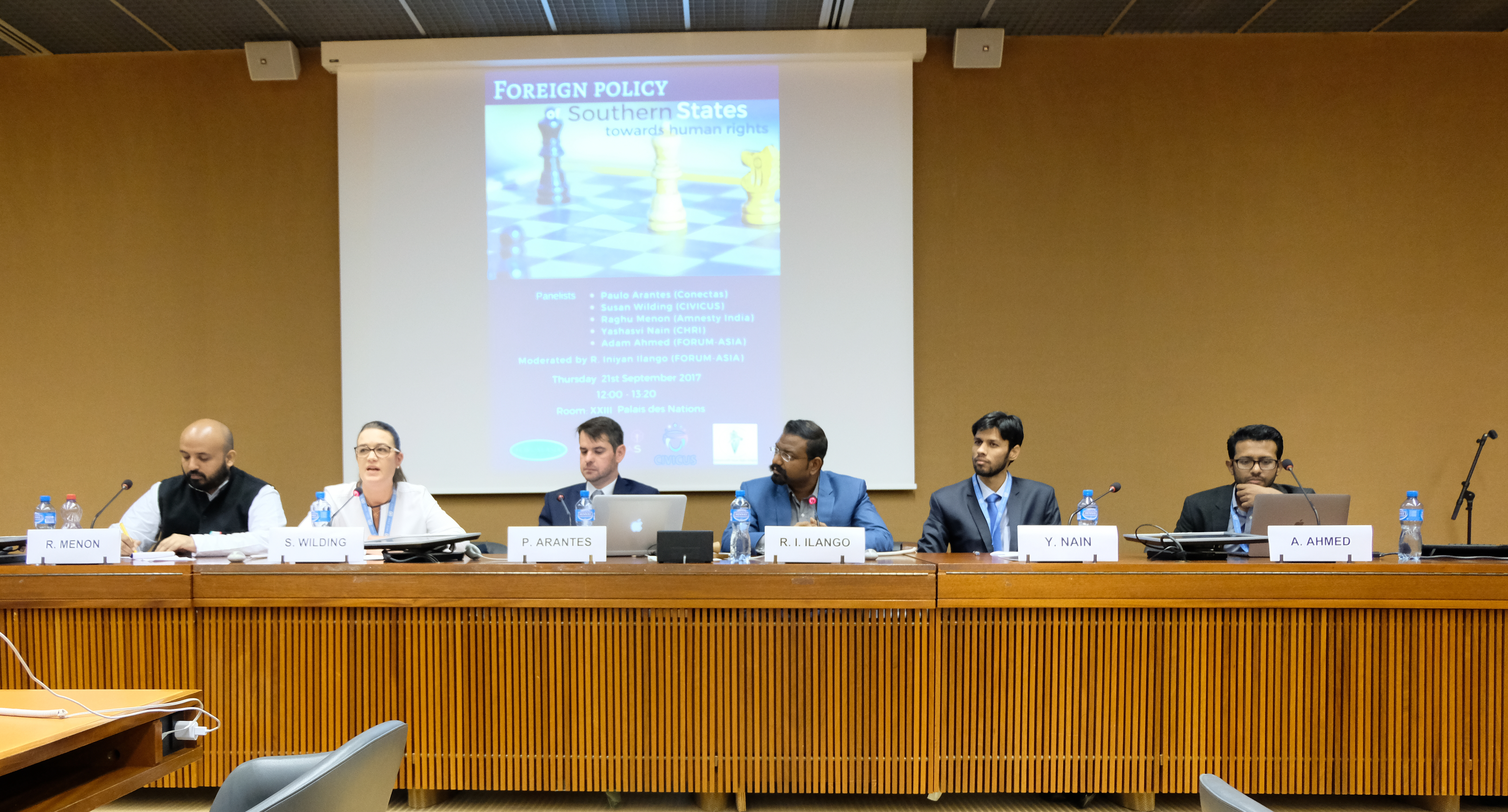
Raghu Menon of Amnesty International India presented the pattern of the government of India to say one thing and do another with respect to foreign policy, particularly on human rights at the national, regional and international levels. Looking at a number of specific instances, such as its vote to remove the term ‘human rights defenders’ from relevant resolutions, its changing position on war crimes in Sri Lanka, and its response towards the Rohingya refugees in the country, he theorised that despite an active civil society, India needs to rethink its stance as a global leader on foreign policy.
Paulo Arantes of Conectas analysed the inward looking and country focussed policy adopted in Brazil. With the lack of transparency and the increasing number of barriers placed on access to information, he concluded that foreign policy cannot be dismissed now more than ever.
Drawing from a report authored by his organisation, Yashasvi Nain of CHRI delved into the role of small states like Botswana, Cameroon, Ghana, the Maldives, Namibia, and Senegal, and their increasing influence at the Human Rights Council. He also stated that due to gaps in training and capacity building, small states cannot function effectively on their foreign policy efforts and require support.
Ahmed Adam of FORUM-ASIA provided a perspective into Asian foreign policy at the Council over the last decade by discussing the findings of an in-depth report produced by the organisation. He highlighted patterns that have continued to exist over the years, such as those of outright rejection of country specific resolutions, and the disconnect between statements and actions of states on thematic resolutions with the situation in their countries.
Human Rights in the Philippines
FORUM-ASIA organised a side event on human rights in the Philippines on 22 September 2017 along with CIVICUS, International Federation for Human Rights (FIDH), Franciscans International, Human Rights Watch, International Service for Human Rights (ISHR), Fastenopfer, and the Global Centre for the Responsibility to Protect. This side event was moderated by R. Iniyan Ilango of FORUM-ASIA.
Ellecer Carlos of the Philippine Alliance of Human Rights Advocates (PAHRA) and In Defense of Human Rights and Dignity Movement (iDEFEND) provided an overview of state sponsored human rights violations in the Philippines, by tracing its path beginning with the ‘war-on-drugs’ and the accompanying extrajudicial killings, the rhetoric of half-truths to manipulate public opinion, and ultimately targeting of all dissenters of the current political regime.
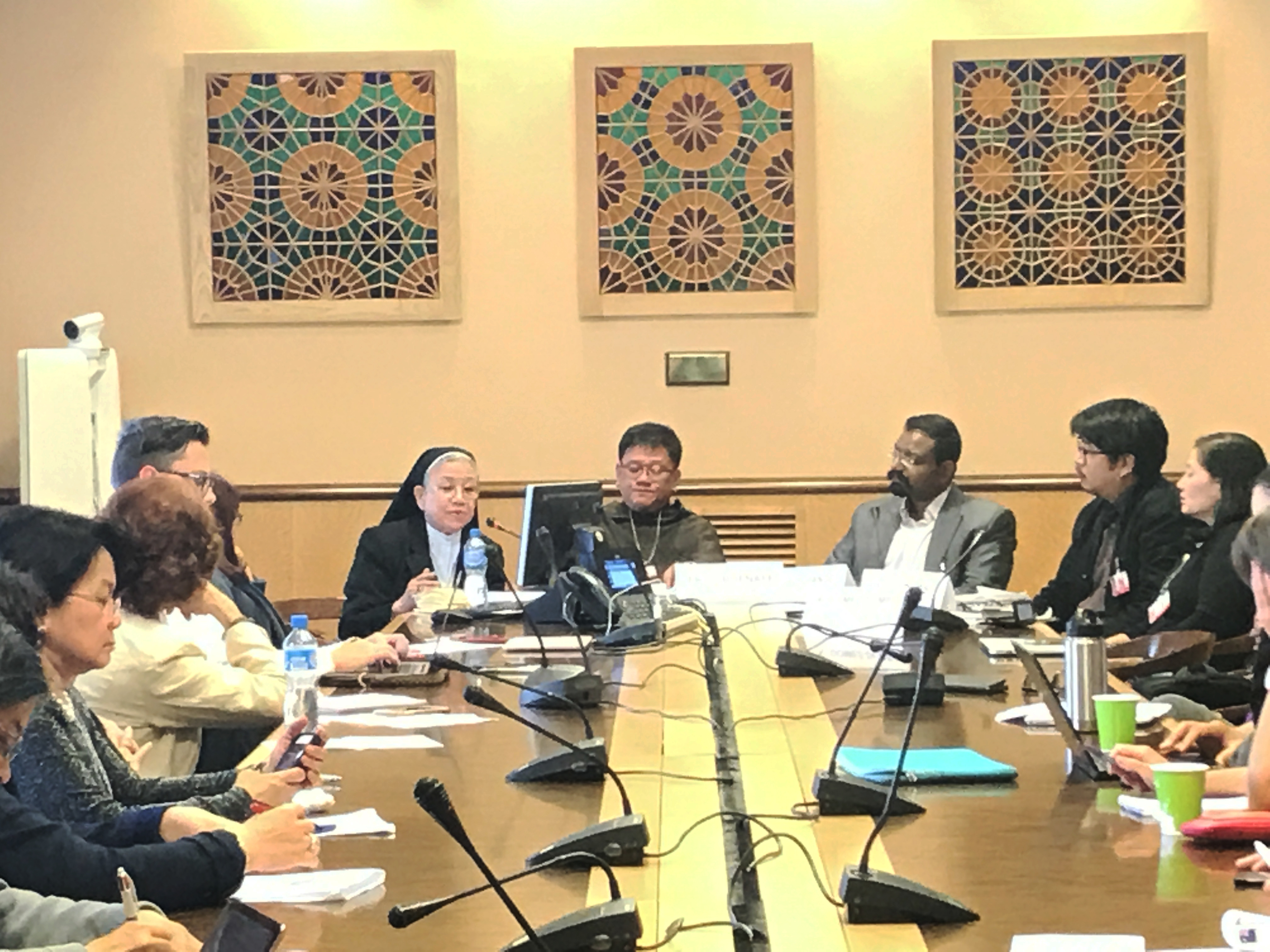
Following this, Karen Gomez-Dumpit of the Commission on Human Rights of the Philippines shed light on the financial barriers and the challenges confronted by her office through a campaign of misinformation, in addition to those introduced through law-making and the ability of the President to exercise his veto power over the process.
Drawing from his work in the South, Father Christian Buenafe of the Task Force Detainees of the Philippines (TFDP) provided an update on instances of human rights violations there, including the declaration of martial law in Mindanao, illegal search and seizures, harassment, enforced disappearances, extrajudicial killings, and the displacement of individuals as well as their families.
Finally, Sister Crescencia Lucero outlined the work of the church in assisting those targeted by the ‘war on drugs’. She explained that the church achieved this by providing sanctuary to those in need, through community rehabilitation programmes, organising volunteers to keep watch at night, expressing solidarity with those affected, and documenting cases of violations.
Documenting International Human Rights Standards and Practice
On 27 September 2017, along with the Human Rights Information and Documentation Systems, International (HURIDOCS), FORUM-ASIA co-organised a side event on documenting international human rights standards and practice, as well as its challenges and benefits. The side event was also an opportunity to launch the Review of Asian Diplomacy and Rights (RADAR), FORUM-ASIA’s platform with data and analysis on the performance of Asian states at the Human Rights Council.
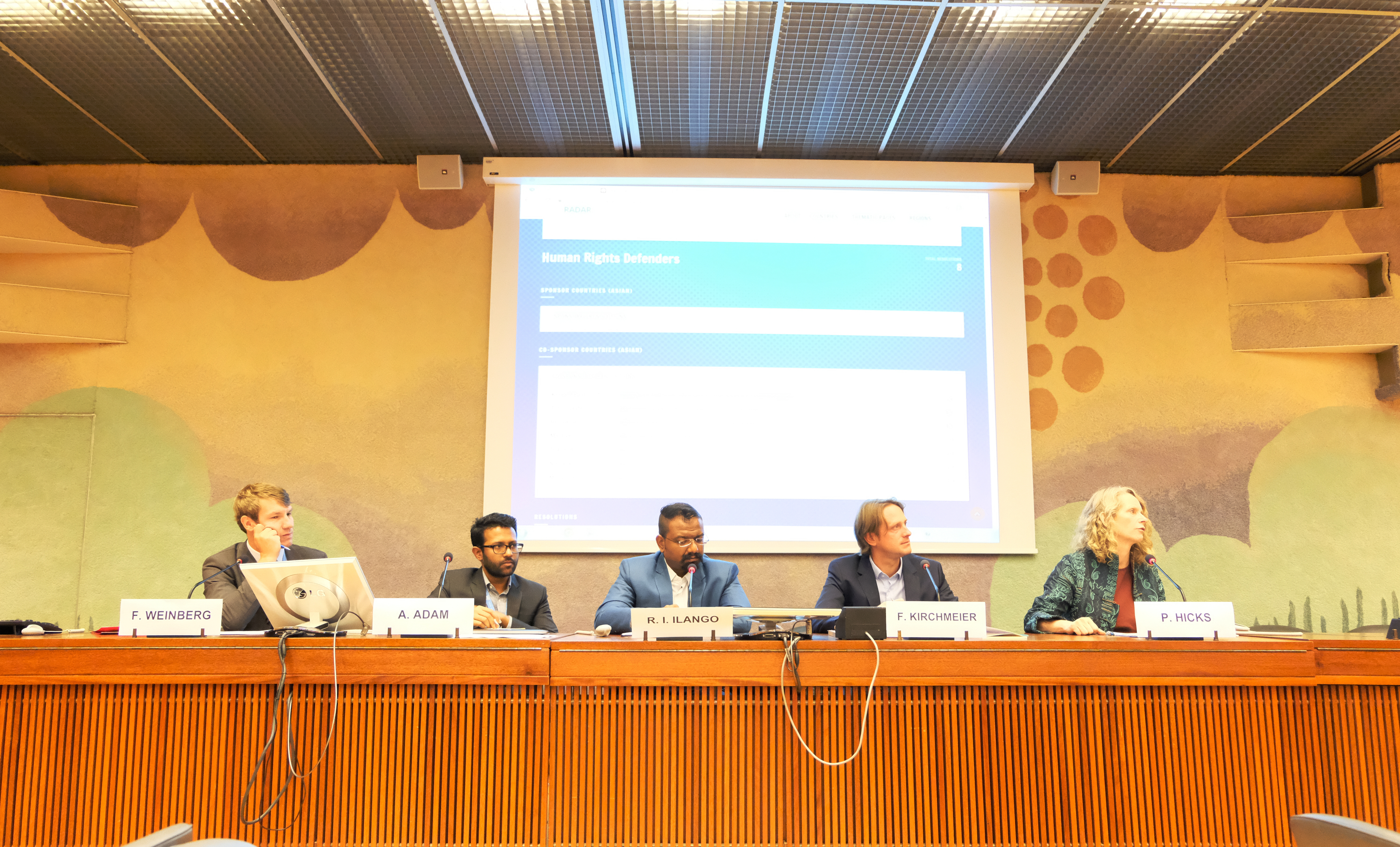
The event commenced with Friedhelm Weinberg, Executive Director at HURIDOCS channelling his experience on human rights documentation and its use by States, international organisations, regional organisations and civil society. Through illustrations of successful examples in place, he highlighted the importance of accessibility of information and creativity in the aggregation of information through multi-stakeholder efforts.
Reinforcing the significance of accessibility, Ahmad Adam of FORUM-ASIA provided a perspective on the patterns gleaned from the action of Asian states at the Human Rights Council through an analytical report produced by the organisation. The report’s analysis of 206 country specific and thematic resolutions, he concluded, attempts to democratise foreign policy by providing a means of generating public awareness that could lead to accountability.

Professor Felix Kirchmeier of Geneva Academy added a different perspective through a survey of the challenges of accessing information on treaty body jurisprudence. He states that there is often no register for all the information coming into the online system of treaty body mechanisms or it is not easily searchable. As a result, their decisions are not in line with their previous jurisprudence. There is also often no interaction among the different treaty mechanisms and with regional systems.
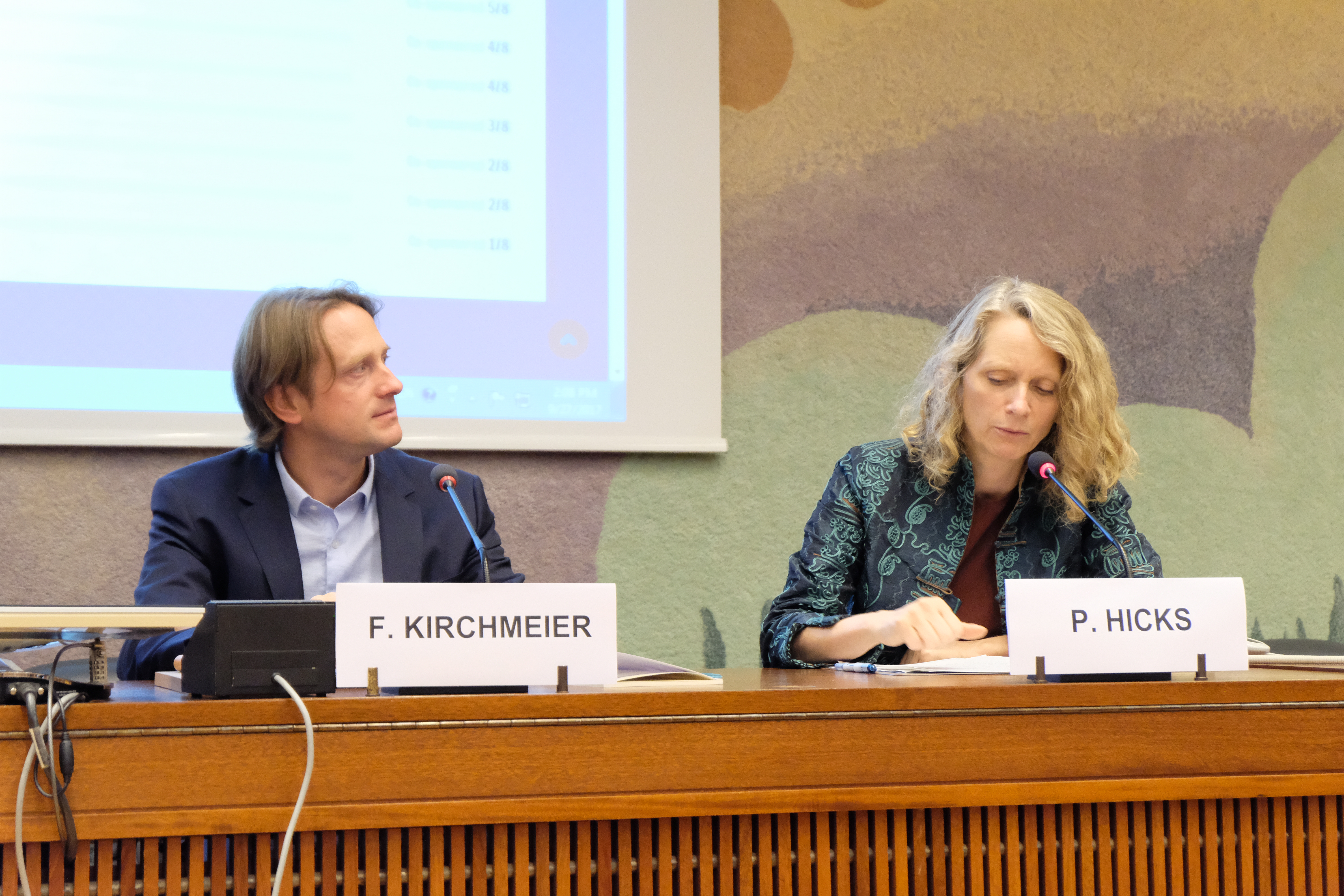
Peggy Hicks of the Office of the High Commissioner of Human Rights (OHCHR) evaluated the role of human rights documentation within the UN system. She placed emphasis on the vital importance of the role documentation has on prevention of human rights violations.
In conclusion, the moderator of the event, R. Iniyan Ilango of FORUM-ASIA, stated that effective documentation and accessibility of information makes human rights processes more meaningful, bringing its goals from the abstract to reality.

